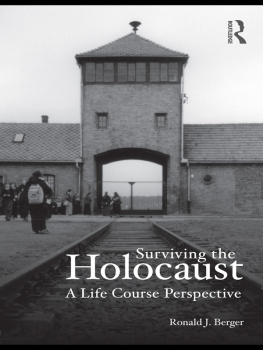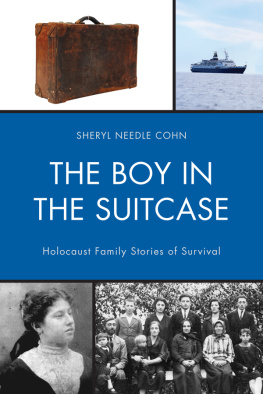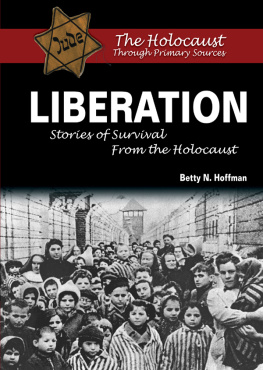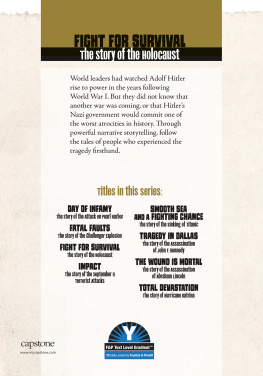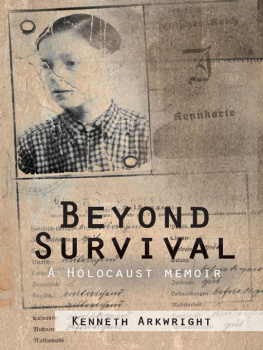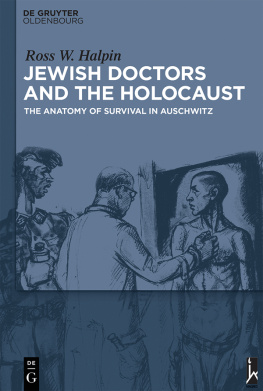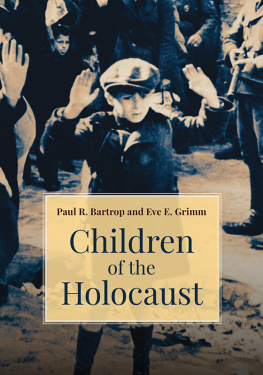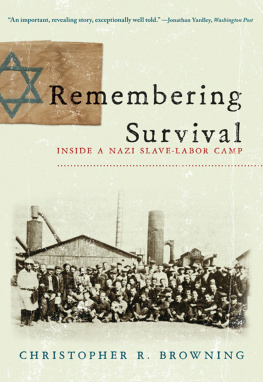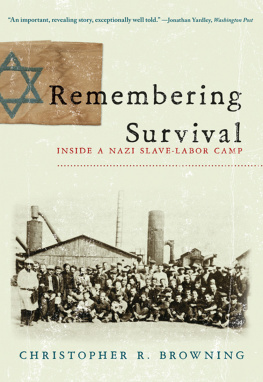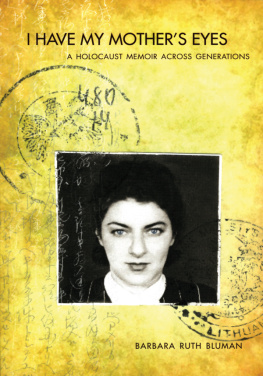AT THE
MERCY OF STRANGERS
SURVIVAL IN NAZI OCCUPIED POLAND
Library and Archives Canada Cataloguing in Publication
Hopfeld, Gitel, 1916-1969
ISBN 0-88962-856-4
1. Hopfeld, Gitel, 1916- 2. Holocaust, Jewish
(1939-1945)--Poland--Sadurki.
3. World War, 1939-1945--Underground movements--Poland--Sadurki.
I. Simchovitch, S. (Sam), 1921- II. Title.
DS135.P63H66 2005 940.53'18'092
C2005-902783-5
No part of this book may be reproduced or transmitted in any form, by any means, electronic or mechanical, including photocopying and recording, information storage and retrieval systems, without permission in writing from the publisher, except by a reviewer who may quote brief passages in a review.
Published by Mosaic Press
Copyright 2005 Simcha Simchovitch
Printed and Bound in Canada.
Designed by Josh Goskey
ISBN ePub 978-1-77161-093-3
ePDF 978-1-77161-094-0
Mosaic Press
1252 Speers Road, Units 1 & 2,
Oakville, Ontario
L6L 5N9
Phone/Fax: 905-825-2130
www.mosaic-press.com
AT THE
MERCY OF STRANGERS
SURVIVAL IN NAZI OCCUPIED POLAND
BY GITEL HOPFELD
TRANSLATED AND EDITED
BY
SIMCHA SIMCHOVITCH


Gitel Hopfeld, 1947
ACKNOWLEDGEMENTS
I am grateful to the following friends for their encouragement and support: Milton Shier, John Pollock, Israel Kopyto and Irving Matlow. I recall with fondness the memory of Velvel Kats (1897 - 2003), a dear unforgetable friend and supporter.
Recognition is due to Howard Aster for his cooperation and assistance in the publication of four of my books by Mosaic Press.
Simcha Simchovitch
Toronto, 2005.

Otwock Museum, Jewish room, 2004

Otwock, May 2004
CONTENTS

Memorial stone for 5,000 Otwock Jews.
INTRODUCTION
GITEL HOPFELD, MY MOTHERS YOUNGEST SISTER, wrote her memoir right after the liberation of Poland. Soon she and her two children left for the DP camps in Germany and from there they emigrated to Israel. There, Gitel tried to rebuild her life; she remarried and settled in Haifa, where I visited her in the summer of 1959. She loved her new country and hoped to live happily with her son and daughter whom she saved so bravely from the Nazi-cannibals. However, she fell ill and died in 1969 and her children left Israel. Her son, Shimon, settled in Paris and Esther in New York, where they still live.
My aunts memoir was originally written in Polish in the form of short notes and brief reminiscences. I not only had to translate it, but to arrange the material chronologically and to broaden it on the basis of Gitels postwar letters and my own knowledge of the events in the Otwock ghetto. This was a labour of love, as I found her memoir to be a moving document of the Holocaust. It tells of the tragic fate of my own family and the Jewish community of Otwock, all of them deported in August 1942 to the death camp of Treblinka or murdered on the spot.
The chapters of Gitels life in the village of Sadurki gives us an insight into a unique segment of Polish Jewry, the so-called village-Jews. For generations these Jews lived in tiny communities among the Polish peasants. They were tailors, shoemakers, inn-keepers or orchard renters and traders of agricultural produce, and drew their livelihood from their gentile neighbours. In the late thirties their existence became precarious due to the rise of anti-Semitism and the economic boycott proclaimed by the ruling Polish circles against the Jews. Soon Poland was overrun by the German armies and the systematic annihilation of the Jewish population in the cities, towns, and villages began.
In Gitels memoir, the attitude of the Polish people to this wholesale murder of their Jewish citizens is honestly depicted. It ranged from open hostility and collaboration with the German authorities, to harsh indifference or passive sympathy. But there was also a brave and noble minority who, at great risk to themselves and their families, provided encouragement and a helping hand to the hunted Jews. The image of Yadwiga Kowalska of Belzyc shines through in all her humanity and bravery. Gitel turned to her whenever she was in a quandary, and Kowalska never hesitated to encourage and help her. Likewise is Duzynec, the headmaster of the Sadurki railway station. He and his wife gave temporary shelter to Gitel and her children and helped her in many critical moments. To these we have to add Grzegorz Kwiatkowski, the regional leader of the underground Polish Home Army, who kept and protected Gitel in the last year of the war, and the two priests who defended little Shimon and his mother.
Reading Gitels memoir one cannot help but be impressed by the strength of her character, her industriousness and her abilities to find ways to save her children in the incessant, day-to-day struggle to survive. She was indeed a woman of valour, a Jewish heroine in the darkest time of our history.
Simcha Simchovitch,
Toronto, 2005
CHAPTER 1
WAR
AFTER MY MARRIAGE IN 1930, I LIVED IN WARSAW in a spacious apartment on Miodowa Street. My husband, Joseph, was a furrier and worked, together with several apprentices, in the large kitchen of our home. During the fall and winter months, they worked till late at night, as this was the season for ladies fur coats, caps and other accoutrements. In the spring and summer, the work stopped and we were free to spend our time in the city or in the country.
In 1932, I gave birth to my son, Shimon, and two years later my daughter, Esther, was born. They were both healthy, lovely children Shimon, fair-haired, slim and composed; Esther, blonde, playful and talkative. We loved them both and gave them our utmost care and attention. During the day, a Polish nanny would walk them to the nearby park and would care for them till bedtime. We spoke Polish to our children because my husband and I considered ourselves modern, non-observant Jews.
I spent the summer months of 1939 with my children in the village of Milosny, not far from Warsaw. During the week my husband remained in Warsaw to prepare his business for the fall and winter season and he came to stay with us on weekends. It was the end of August 1939. The news on the radio became more and more frightening as the German accusations and threats against Poland intensified and portended an imminent aggression. In the last weekend of August, my husband arrived in Milosny and we returned with him to Warsaw. The mood in the city was panic-stricken. People were excited and scared because of rumours of German gas attacks and bombardments that may come at any moment. My husband began to store food and bottled water for any emergency.
On the first of September, in the morning, I left the enclosed courtyard of our apartment complex to buy some groceries in a nearby store. I was only half a block away from our gate when I suddenly heard a terrifying explosion a bomb came down on the front section of our building. O God, where are my children?! I called aloud and began rushing back home. I entered our yard calling, Shimek, Estusia, where are you? Finally, I was directed to the air shelter in the basement of the building where many people sought refuge. Our next door neighbour had brought our children there as soon as he heard the warning of the air attack over the radio. Soon my husband appeared and we all returned to our second floor apartment which, luckily, was not damaged.
Next page

